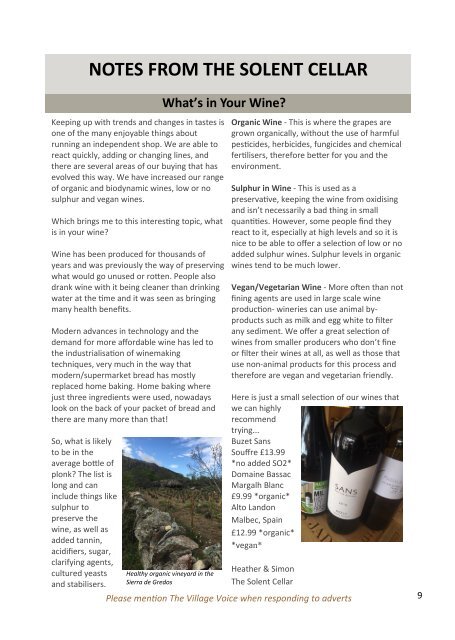The Village Voice Oct Nov 2018
Create successful ePaper yourself
Turn your PDF publications into a flip-book with our unique Google optimized e-Paper software.
NOTES FROM THE SOLENT CELLAR<br />
What’s in Your Wine?<br />
Keeping up with trends and changes in tastes is<br />
one of the many enjoyable things about<br />
running an independent shop. We are able to<br />
react quickly, adding or changing lines, and<br />
there are several areas of our buying that has<br />
evolved this way. We have increased our range<br />
of organic and biodynamic wines, low or no<br />
sulphur and vegan wines.<br />
Which brings me to this interesting topic, what<br />
is in your wine?<br />
Wine has been produced for thousands of<br />
years and was previously the way of preserving<br />
what would go unused or rotten. People also<br />
drank wine with it being cleaner than drinking<br />
water at the time and it was seen as bringing<br />
many health benefits.<br />
Modern advances in technology and the<br />
demand for more affordable wine has led to<br />
the industrialisation of winemaking<br />
techniques, very much in the way that<br />
modern/supermarket bread has mostly<br />
replaced home baking. Home baking where<br />
just three ingredients were used, nowadays<br />
look on the back of your packet of bread and<br />
there are many more than that!<br />
So, what is likely<br />
to be in the<br />
average bottle of<br />
plonk? <strong>The</strong> list is<br />
long and can<br />
include things like<br />
sulphur to<br />
preserve the<br />
wine, as well as<br />
added tannin,<br />
acidifiers, sugar,<br />
clarifying agents,<br />
cultured yeasts<br />
and stabilisers.<br />
Healthy organic vineyard in the<br />
Sierra de Gredos<br />
Organic Wine - This is where the grapes are<br />
grown organically, without the use of harmful<br />
pesticides, herbicides, fungicides and chemical<br />
fertilisers, therefore better for you and the<br />
environment.<br />
Sulphur in Wine - This is used as a<br />
preservative, keeping the wine from oxidising<br />
and isn’t necessarily a bad thing in small<br />
quantities. However, some people find they<br />
react to it, especially at high levels and so it is<br />
nice to be able to offer a selection of low or no<br />
added sulphur wines. Sulphur levels in organic<br />
wines tend to be much lower.<br />
Vegan/Vegetarian Wine - More often than not<br />
fining agents are used in large scale wine<br />
production- wineries can use animal byproducts<br />
such as milk and egg white to filter<br />
any sediment. We offer a great selection of<br />
wines from smaller producers who don’t fine<br />
or filter their wines at all, as well as those that<br />
use non-animal products for this process and<br />
therefore are vegan and vegetarian friendly.<br />
Here is just a small selection of our wines that<br />
we can highly<br />
recommend<br />
trying...<br />
Buzet Sans<br />
Souffre £13.99<br />
*no added SO2*<br />
Domaine Bassac<br />
Margalh Blanc<br />
£9.99 *organic*<br />
Alto Landon<br />
Malbec, Spain<br />
£12.99 *organic*<br />
*vegan*<br />
Heather & Simon<br />
<strong>The</strong> Solent Cellar<br />
Please mention <strong>The</strong> <strong>Village</strong> <strong>Voice</strong> when responding to adverts<br />
9


















